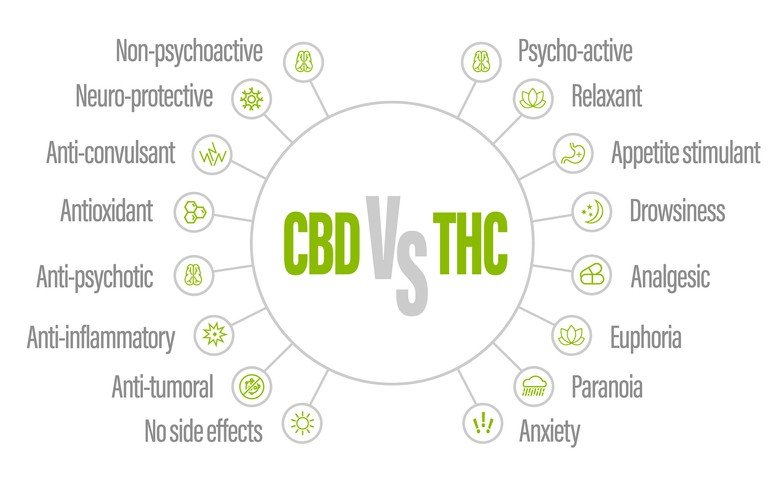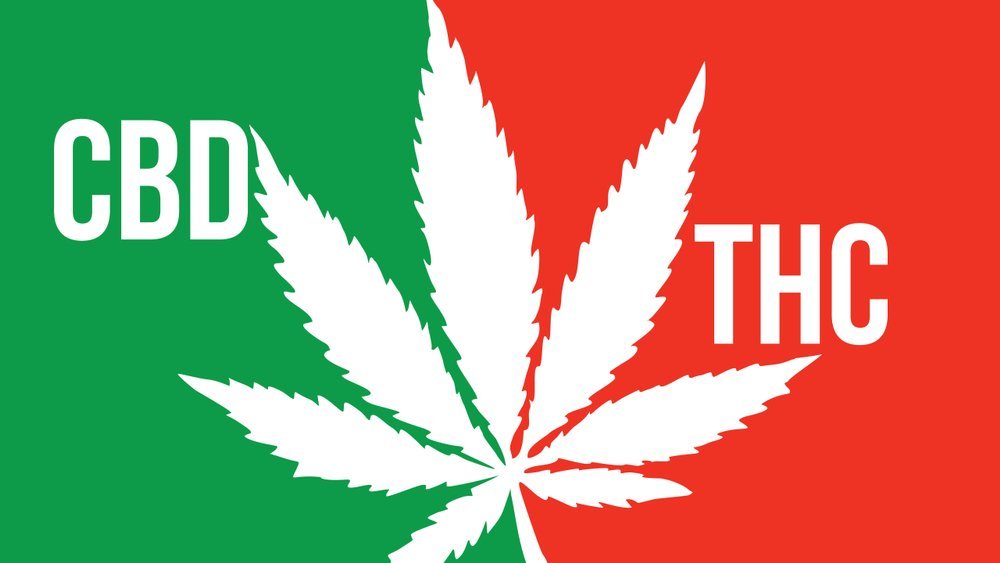CBD (cannabidiol) and THC (delta-9 THC) are the two main cannabinoids found in cannabis and hemp plants. While they share the same origin, their effects and roles in the body are remarkably different.
CBD is known for its calming, non-psychoactive properties, while THC is the compound responsible for the “high” that cannabis is famous for. Yet, both work together in fascinating ways that can influence your overall wellness.
In this guide, we’ll break down their differences, effects, benefits, and relationship, helping you understand exactly how CBD and THC interact inside your body — and what that means for you.
What Is CBD?
CBD, short for cannabidiol, is one of the primary cannabinoids found in hemp and cannabis plants. Unlike THC, it doesn’t cause any intoxicating or “high” effects. Instead, it’s valued for its calming, anti-inflammatory, and therapeutic potential.
CBD works by interacting indirectly with the body’s endocannabinoid system (ECS) — helping it maintain balance in areas like mood, pain, stress, and sleep. Rather than directly binding to cannabinoid receptors (as THC does), it influences how your body uses its own endocannabinoids to promote overall well-being.
Common Benefits of CBD
Research and user experiences suggest that CBD can help:
Reduce stress and anxiety.
Support better sleep.
Ease inflammation and pain.
Promote relaxation and focus.
Balance mood and emotional stability.
Popular CBD Product Types
You’ll find CBD in many forms — oils, gummies, capsules, topicals, and vapes. Each delivers effects differently: oils act faster under the tongue, while edibles provide longer-lasting relief.
CBD products are also categorized by their cannabinoid content:
Full-Spectrum: Includes THC (under 0.3%) plus other cannabinoids and terpenes for the “entourage effect.”
Broad-Spectrum: Contains multiple cannabinoids but no detectable THC.
Isolate: Pure CBD with no other cannabinoids.
What Is THC?
THC, short for tetrahydrocannabinol, is the primary psychoactive compound found in cannabis. It’s the ingredient responsible for the “high” feeling people often associate with marijuana use.
THC binds directly to CB1 receptors in the brain and nervous system — the same receptors that influence mood, perception, appetite, and memory. This strong connection is what produces its euphoric and mind-altering effects.
Common Effects and Benefits of THC
In moderate amounts, THC can help:
Relieve chronic pain.
Stimulate appetite.
Reduce nausea.
Support deeper relaxation and sleep.
Improve mood and creativity.
However, high doses can lead to temporary side effects such as getting too buzzed-out, dry mouth, dizziness, or increased heart rate — which is why it’s important to start low and go slow with THC.
CBD vs. THC: What Are the Differences?

Although CBD and THC come from the same plant family, they act on your body in very different ways. The biggest difference? THC makes you feel high, while CBD doesn’t.
CBD interacts more gently with your body’s receptors to promote balance and calm, while THC binds directly to brain receptors that affect perception and mood.
Both can support pain relief, stress reduction, and sleep, but the overall experience they create is different.
Here’s a quick comparison:
| Aspect | CBD (Cannabidiol) | THC (Tetrahydrocannabinol) |
|---|---|---|
| Psychoactive Effect | Non-psychoactive | Psychoactive (“high”) |
| How It Works | Indirectly influences CB1/CB2 receptors | Binds directly to CB1 receptors in the brain |
| Common Effects | Relaxation, focus, anxiety relief | Euphoria, altered perception, relaxation |
| Medical Benefits | Anxiety, inflammation, pain, and sleep | Pain, nausea, appetite, and sleep |
| Side Effects | Mild (dry mouth, drowsiness) | Euphoria, dry mouth, red eyes, increased appetite |
| Legality (U.S.) | Federally legal if hemp-derived (<0.3% THC) | Federally illegal; legal in certain states |
| Best For | Calm, balance, daily wellness | Relief, recreation, stronger relaxation |
In short, CBD supports balance, THC changes perception—but when combined, they can complement each other, creating a more rounded experience.
How CBD and THC Work Together? (The Entourage Effect)
While CBD and THC have very different effects on their own, they can work better together — a phenomenon known as the entourage effect.
The entourage effect describes how cannabinoids, terpenes, and other plant compounds interact in the body to enhance each other’s benefits. Instead of working in isolation, they combine to produce a more balanced and effective experience.
For example:
CBD can soften THC’s psychoactive effects, helping reduce anxiety or paranoia that some users feel with high-THC products.
THC can amplify CBD’s calming and pain-relieving properties, offering stronger overall relief.
That’s why full-spectrum CBD products, which contain a small amount of THC (less than 0.3%), often deliver broader and longer-lasting benefits than CBD isolate alone. This natural harmony between cannabinoids makes them especially effective for stress, pain, and sleep support.
In simple terms, CBD helps smooth the edges of THC, and THC helps CBD work more deeply — making the combination more effective than either alone.
Legal Status of CBD and THC
The legality of CBD and THC in the U.S. still depends on where they come from and how much THC they contain.
CBD
Under the 2018 Farm Bill, hemp-derived CBD (containing less than 0.3% Delta-9 THC by dry weight) is federally legal in the U.S. This means you can legally buy and use hemp-based CBD products — like oils, gummies, or topicals — in most states.
However, the FDA has not yet formally approved CBD for general wellness use (outside of prescription drugs like Epidiolex). Some states have additional restrictions on CBD in food or beverages, so it’s essential to check your local regulations.
THC
THC legality varies widely from state to state.
Cannabis-derived THC (Delta-9) remains federally illegal because marijuana is still classified as a Schedule I substance under the Controlled Substances Act.
However, many states have legalized THC for medical or recreational use, each with its own rules on possession limits, product types, and age restrictions.
Hemp-derived THC (such as Delta-8, Delta-9, or Delta-10 THC extracted from hemp) remains federally legal when it meets the 0.3% THC limit — though some states have moved to ban or regulate these products due to their psychoactive effects.
Bottom Line
In 2025, hemp-derived CBD is legal nationwide (with minor state restrictions), while THC laws depend entirely on where you live. Always check your state’s current cannabis and hemp regulations before purchasing or using any product that contains THC.
CBD and THC: Which One to Choose?
Deciding between CBD and THC depends on what you’re looking to achieve and how you want to feel. Both compounds offer unique benefits, and sometimes the best results come from combining them.
When to Choose CBD
Go with CBD if you want:
Calm and relaxation without intoxication.
Daily wellness support (focus, mood, sleep, recovery).
Relief from anxiety, mild pain, or inflammation.
A clear mind — perfect for daytime use.
CBD is ideal for those who want the benefits of cannabis without the high. It’s also the better option for people who are new to cannabinoids or live in states with stricter THC laws.
When to Choose THC
Choose THC if you’re looking for:
Stronger pain or stress relief.
Help with sleep or appetite.
A relaxing or euphoric experience.
THC’s psychoactive nature makes it more suitable for evening or recreational use, but it can also provide deeper physical relief when used in moderation.
When to Use Both
For many people, CBD and THC work best together. A balanced formula — such as full-spectrum CBD oil or a low-dose Delta-9 gummy — allows both cannabinoids to complement each other through the entourage effect, enhancing benefits while reducing THC’s risk.
FAQs
1. Is CBD more potent than THC?
No. CBD and THC work differently — THC has stronger psychoactive effects, while CBD is more about balance and calm. CBD won’t make you feel high but can still offer powerful benefits for stress, sleep, and pain.
2. Can you take CBD and THC together?
Yes. When used together, they create the entourage effect, which means they enhance each other’s benefits. Many users find that combining the two offers better relief and relaxation than using either alone.
3. Does CBD cancel out THC’s high?
In some cases, yes. CBD can help reduce the intensity of THC’s psychoactive effects — especially anxiety or paranoia from higher doses. That’s why many balanced or full-spectrum products include small amounts of both.
4. Will CBD or THC show up on a drug test?
THC will show in a drug test, but CBD itself won’t show up. However, full-spectrum CBD products contain trace amounts of THC that can trigger a positive test. If you’re tested regularly, choose broad-spectrum or THC-free CBD products.
5. Are CBD and THC safe to use long-term?
Both are considered safe when used responsibly. Still, it’s best to start with low doses and buy from reputable brands that provide third-party lab results (COAs) for quality assurance.
Final Thoughts
CBD and THC may come from the same plant, but they offer completely different experiences.
CBD supports balance and calm without the high, while THC provides stronger physical and mental effects. When combined, they can complement each other for a more rounded experience.
The key is knowing what works for your body — and starting slow until you find your comfort zone.
Disclosure:
The information provided in this article is meant for general use only and may not always suit everyone’s individual needs. Your health and wellness are personal, so consult a medical professional for personalized advice before making decisions based on this content.
For more information, please read our Disclosure Policy.

